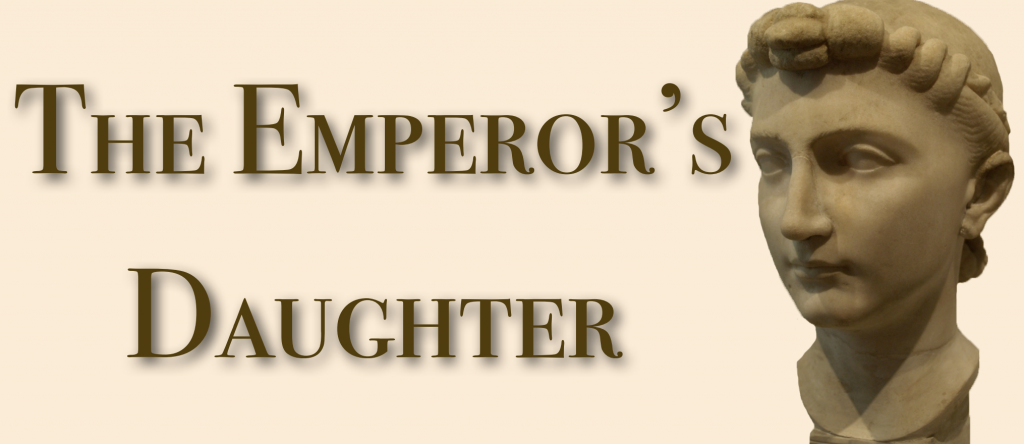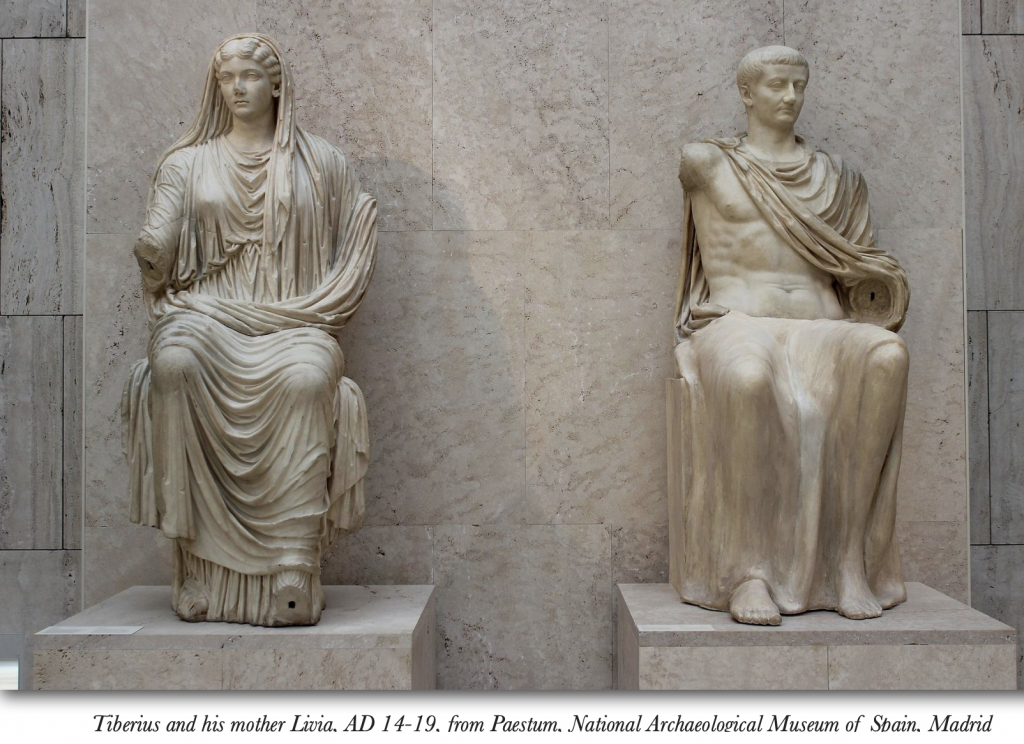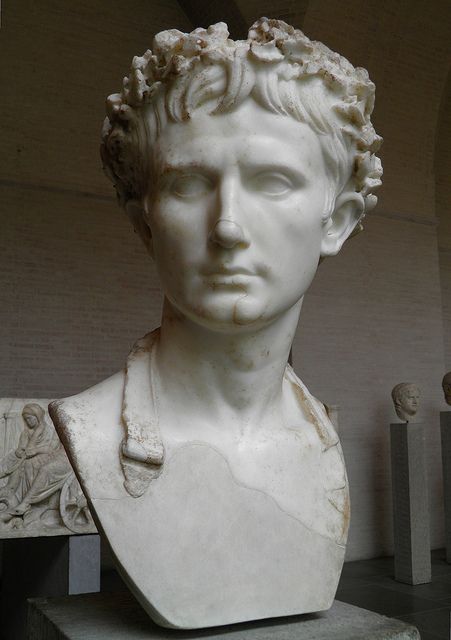
All of Rome was in an uproar. No one had imagined that even a cold fish like Augustus was capable of exiling his only biological child, Julia, to a barren and windswept island. “Let her be banished for life,” he is recorded as saying about Julia’s exile. Yet it was not enough for her to be merely banished from her beloved Rome, Augustus further decreed that aside from the guards who kept watch, no men were allowed on the island. The implication was that because she was reportedly a woman of ill-repute being deprived of male companionship would make for a more exacting punishment. Along those same lines, wine was forbidden on that gloomy enclave and food provisions were at a bare minimum. In other words, for all intents and purposes, Julia was in prison.
Known for her joie de vivre, Julia was adored both within the palace and outside of it. Her magisterial father had once endearingly referred to her as “Juliola”—indeed, she had been the apple of his eye—so what could account for their sudden break? While her flagrant extra-marital activity may have played a role, would that alone have warranted such an extreme exile? Some believe she was involved in a political intrigue to overthrow Augustus himself. But many historians now think that was likely not the case. After all, why would she act against her own better interests? As it was, her eldest two sons were adopted by Augustus and primed for imperial succession. Although her role in the so-called conspiracy is questionable, her extra-marital activity against Tiberius is legendary. Yet who can fault Julia for rebelling after she was used as a political pawn in one marriage scheme after another? As the emperor’s daughter, all of Julia’s three marriages were borne from political expediency; with her final marriage to Tiberius so bereft of human feeling that they seldom spoke to each other much less felt compelled to cohabitate. But, before we get ahead of ourselves, let’s begin at the beginning.

Although Julia was the only child of Augustus, she most definitely was not Livia’s. Rather, Julia was the daughter of Scribonia, Augustus’ second wife. Indeed, no sooner was Scribonia out of labor then Augustus (merely Octavian back then) served her with divorce papers. As grounds for divorce in Rome, a husband might merely state that in addition to his wife being troublesome, she was also abhorrent in bed; both reasons Octavian used in the divorce decree. And while divorce was easy enough for an upper-class husband to obtain, as head of the household, maintaining custody of the children was routine. Shortly after his divorce from Scribonia, Octavian had the infant Julia whisked away to his house on Palatine Hill under the glacial and exacting eye of Livia, who by that point had become Augustus’ third, final and most indelible wife.
To be sure, Livia resented the very existence of Julia and played quintessential step-mother to the spirited child. All the while, Livia’s frustration must have been mounting when with each passing year it became all too obvious that the servile Scribonia had succeeded where Livia would most acutely fail. Though she had two sons from a previous marriage, the ever-willful Livia was never to produce an heir for Augustus. Alas, the first imperial couple of Rome may have had many attributes but being fruitful was not one of them.
Ironically, for a couple that would go on to define themselves by their morality, they had a rather licentious beginning. They were both married when they met. Octavian to Scribonia, and Livia to Tiberius Claudius Nero. Livia and Nero had one son, Tiberius—the same who would become emperor after Augustus’ death—and was pregnant with another, Nero Claudius Drusus. In fact, it was while she was still pregnant with Drusus that she married Octavian. Never one to let anything as pesky as marriage get in the way of his political ambition, the truth is Livia Drusilla was a much better match for the calculating Octavian than Scribonia. The Claudians were one of the oldest and most aristocratic families in all of Rome and because she and her first husband were cousins, Livia was not only married to a Claudian she was of Claudian descent herself. Together Octavian and Livia represented the houses of Julio and Claudian with Octavian hailing from the venerable Julio line (which included his Great Uncle Julius Caesar). The earliest Roman imperial regime—the Julio-Claudian dynasty—for good—but in most cases bad—would include the first five Roman emperors: Augustus, Tiberius, Caligula, Claudius and Nero. An aside, although Augustus was certainly an emperor, he never went by that title in his lifetime. In truth, his great-uncle’s life was cut tragically short by the mere mention of his acting as emperor. Instead, Augustus went by the title of first citizen or princeps during his 41-year reign.

A patrician by birth and demeanor, Livia was put in charge of Julia’s education. Ever the taskmaster, Livia made sure that her charge was busy from dawn until dusk. In addition to the quotidian studies as befitting an emperor’s daughter such as memorizing Homer, understanding history and inculcating culture, Livia added traditionally conservative tasks such as weaving and spinning as well. The young Julia barely had a moment’s rest adhering to her step-mother’s strict edicts. With her every move, Julia was watched. As a child, she could only socialize with those who had been properly vetted by her father. Then at the ripe, old age of fourteen, the time came for marriage. Against the fierce protestations of his ever-ambitious wife, Augustus (his handlers coined the term for him in 27 BCE) had just the match, his beloved nephew, Marcellus—aged 17, the son of his sister Octavia and thus first cousin and playmate to Julia. As Augustus’ nephew, Marcellus was his closest male relative and his marriage to Julia set him up as Augustus’ chief heir and likely successor. Livia, whose dour son Tiberius was the same age but paled in comparison to the charismatic Marcellus, could do nothing but look on in resigned frustration as the merger became a reality. But alas, the marriage only lasted two years and produced no issue. An epidemic was spreading throughout the Roman Empire which infected both Augustus and his young scion. After a bout which nearly killed him, Augustus eventually recovered but Marcellus was not as fortunate and perished at the tender age of nineteen. Marcellus was a Roman darling and his death set off a period of mourning that resulted in some of the greatest poetry of the age. Both Virgil in the Aeneid and Propertius in Elegies wrote movingly of his passing.
But was Marcellus’ death truly natural? At this point mention should be made of the age-old rumor regarding Livia’s role in the premature passing of Marcellus and other heirs of Augustus. History seems to bear out that each time a dynastic successor for Augustus emerges, he is met with an untimely end. No sooner was Marcellus laid to rest, then rumor spread that Livia had a hand in his death. After all, it was her son Tiberius who would be next in line for the throne. The scheming Livia was a notorious poisoner in Robert Graves’ I, Claudius, with her going so far as to poison her own biological son (Drusus) and grandson (Germanicus). While Livia was almost certainly a manipulator—and may have had more than a little to do with Julia’s harsh banishment—most scholars poo-poo the notion that she was a serial poisoner. They say in an extended household, more Julio than Claudian, Livia would likely have been hard pressed to facilitate anything as drastic as poisoning and, if discovered, would have had more to lose than to gain. However, the pattern is vexing. The four possible Julio successors to the throne (first Marcellus, then Julia’s three sons: Lucius then Gaius and finally Agrippa Posthumous) only lived to an average age of twenty-two years. Was bad luck or human intervention to blame?
Nevertheless, if Livia did have a hand in Marcellus’ death, it was all for naught for within a short year, Augustus saw fit to marry his widowed daughter, to his close friend and war hero, the mighty general and consul, Marcus Vispanius Agrippa, making him the next heir-apparent. Agrippa, who was twenty-five years Julia’s senior—a man her father’s age—was already married to Augustus’ niece, Marcella. But something as trite as Agrippa’s marriage to another didn’t stop Augustus from fashioning Agrippa as his next son-in-law. Indeed, when it came to marriage, Augustus was more concerned with dynastic aspirations than with feelings of the heart. Time and again, it is ironic for an emperor who would become known for his strict marriage laws to have been so cavalier about the institution when it suited him politically.
Dutifully as ever, the now eighteen-year-old Julia marched to her father’s orders. Although we can never know the tenor of their relationship, by all that is used to measure a marriage, theirs appeared adequate. In the nine years they were married, they had a total of five children, four during Agrippa’s lifetime (Gaius Caesar, Julia the Younger, Lucius Caesar, and Agrippina the Elder –mother of Caligula) and one son born after he passed, Agrippa Posthumous. In 12 BCE, while at their summer home in Campania, the vital Agrippa succumbed suddenly at the age of fifty-one. After Agrippa Posthumous was born—thus while still in mourning for her husband—once again Augustus had his newly widowed daughter betrothed, this time to Tiberius. But Tiberius was already happily married. In fact, Tiberius had been down this path with his step-father eight years prior when—for purely political reasons yet again—Augustus married him to Vipsania Agrippina (the first daughter of Agrippa). According to Suetonius, in 11 BCE Tiberius divorced Vipsania non sine magno angore animi (not without great mental anguish). At the time of their heartbreaking divorce, a pregnant Vipsania ended up losing their second child. Alas, the union of Julia and Tiberius had an inauspicious start.
More or less raised as brother and sister, Julia and Tiberius literally grew up together in the Julio-Claudian palace on Palatine Hill. At one point, rumor has it that the vivacious young Julia had a crush on the solemn Tiberius. Those days long gone, they initially tried to make a go of the marriage resulting in Julia’s pregnancy. But theirs was not destined to be a happy union and the baby boy died in infancy. They separated soon after when—much to the consternation of his step-father—Tiberius moved to Rhodes “retiring” from Roman politics. With a husband over fourteen hundred miles away, ever the bon-vivant, Julia didn’t let any grass grow under her feet. She ran with a sophisticated crowd who viewed extramarital activities with nonchalance. In fact, if she had been anyone else’s daughter her lifestyle would not have been problematic. But she was the emperor’s daughter and several years before in order to increase marriage and procreation, Augustus had put his strict Julian Marriage Laws into effect. As it pertains to Julia, one of the provisions of the law stated that adultery was a crime punishable by exile and confiscation of property and further that fathers were permitted to kill daughters and their partners in adultery. Because Julia’s adultery became well-known, the belief is that Augustus was under pressure to make an example of his daughter.

Despite the iron hand of the adultery law coming down hard on her, Julia was not the only member of the family who made a mockery of marriage. While Augustus either arranges or breaks apart marriages depending on dynastic advantage, his lechery is often overlooked. But the truth is from his early days as Octavian to the end of his reign, Augustus was known to regularly abuse, assault and rape women indiscriminately. Suetonius proclaims: “The charge of being a womanizer stuck, and as an elderly man he is said to have still harbored a passion for deflowering girls, who were collected for him from every quarter, even by his wife!” To be sure, Julia’s promiscuity appears tame by comparison. In fact, history glosses over the irony that the crime for which Julia was severely punished was being abundantly committed by her imperial father, all the while, preaching family values from on high. For millennia, Julia has been derided for her loose morals by one historian after another yet when his promiscuity is discussed at all Augustus is nearly revered by what one contemporary historian calls his “rapacious sexual appetite.” Alas, the double standard, fat and happy during Roman times, is still alive and well in ours. At the time of her banishment Julia was linked to a few men, though only tied romantically to one of them. At long last, after three marriages and six pregnancies, the thirty-eight-year old Julia had found love. Yet for her it proved to be too late.
Once banished, in a show of support and undying love, Scribonia chose to accompany her daughter into exile and would ultimately die there. Meanwhile, the public would not soon forget their darling princess and staged protests for her pardon. “Fire will sooner mix with water than that she shall be allowed to return,” retorted the unyielding princeps. In a playful response, the people threw lit torches on the river. Unamused Augustus charged: “If you ever bring up this matter again, may the gods afflict you with similar daughters or wives.” After five years Julia was moved from the island of Pandataria (present day Ventotene) to the Italian mainland in Rhegium (today’s Reggio Calabria). But even though the location changed, the banishment endured and the harsh prohibitions against men and alcohol along with meager food provisions remained the same. She lived in exile for the last sixteen years of her life and heartbreakingly would outlive all three of her sons. Never to return to her beloved Rome nor see her father again, when Augustus died in 14 CE, the new emperor, Tiberius, exacted his revenge on his former wife and stopped all food provisions to her isolated outpost. Sometime in 14 CE, at the age of fifty-two, Julia died of malnutrition. In fact, her exile in the year of 2 BCE figured so prominently in the psyche of the Romans that subsequent historians used it in determining the supposed year of the birth of Jesus Christ.
Published on Classical Wisdom
